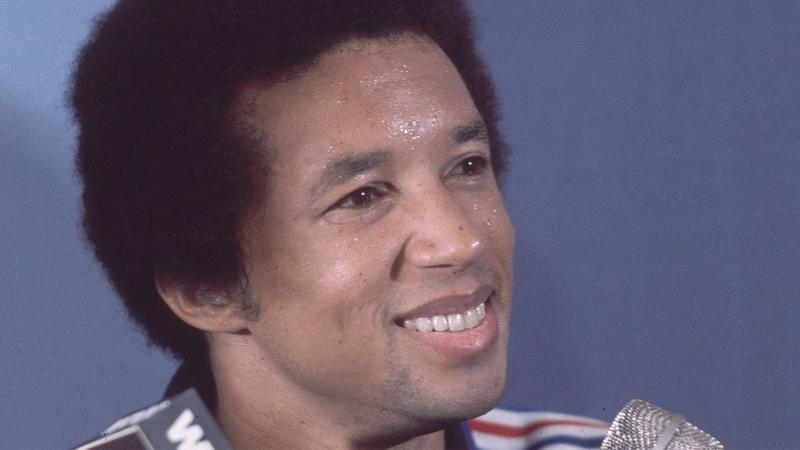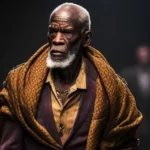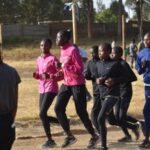In February 1976, Arthur Ashe – three-time Grand Slam singles champion, including the 1970 Australian Open – and some of his contemporaries cheerfully jetted off to Nigeria to participate in the Lagos Tennis Classic.
A week later, they were forced off the court at gunpoint – and were soon fleeing the country for their lives.
Ashe was the most famous member of the group that had flown to Africa for the Lagos-based round of the World Championship of Tennis (WCT), which had a $60,000 prize fund courtesy of business tycoon Olatunji Ajisomo Alabi – popularly known as Lord Rumens.
Ashe was the reigning Wimbledon singles champion, but also on the trip were Tom Okker, Dick Crealy, Jeff Borowiak and Brian Fairlie.
The tournament’s big claim at the time was that it was the first of its kind in black Africa.
Coincidentally, Brazilian football icon Pele was also in Nigeria that February on an ambassadorial tour sponsored by Pepsi.
The director of Nigeria’s International Tennis Academy, Godwin Kienka, remembers it as a great moment for lovers of sport in the country.
“Arthur Ashe was as famous as Pele was in football. It was auspicious,” he recalled.
“It just happened that two great sportsmen were in the country at the same time.”
Forced off court
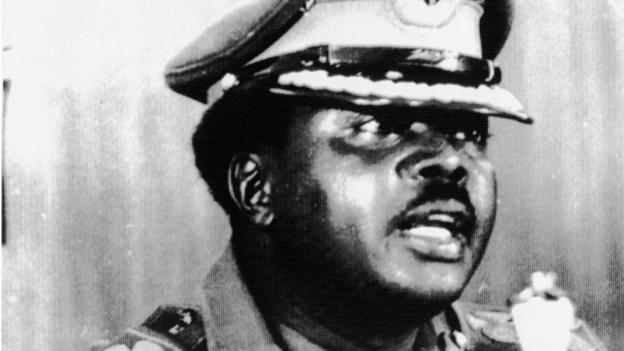
The tournament at the Lagos Lawn Tennis Club (LLTC) had passed off without a hitch until Friday 13 February, the fourth day of the Open.
That was the day General Murtala Mohammed, the Nigerian head of state, was assassinated whilst on his way to work in Lagos as part of a military coup attempt .
Nonetheless, the organisers of the tournament – led by John McDonald, international director of the WCT – pushed for the tournament to continue, despite the chaos that began to envelop the country.
WHO WAS ARTHUR ASHE?
- Started playing tennis at the age of six
- First black player selected to the United States Davis Cup team, winning four titles
- Only black man ever to win the singles titles at the US Open (1968), the Australian Open (1970) and Wimbledon (1975)
- Also won Grand Slam doubles titles at the French Open (1971) and the Australian Open (1977)
- Retired in 1980
- Believed to have contracted HIV from a blood transfusion he received during a heart bypass surgery in 1983
- Died from Aids-related pneumonia in 1993
Matches resumed on Sunday 15 February, with four Americans – Dick Stockton, Bob Lutz, Ashe and Borowiak – in the quarter-finals.
A day later, the LLTC was filled to capacity with spectators on centre court excitedly taking their seats to watch Ashe play his semi-final against Borowiak.
But, just as it began, five men marched on to the court and stopped play.
“Arthur Ashe was actually playing a match when the army guys – upset about the coup and the murder of Murtala Mohammed – came,” remembered Kienka, picking up the story.
“And they said, ‘what are you guys doing here?'”
According to Kienka, Ashe and Borowiak raised their hands in a surrender motion. They were told “get out of here” and then “they led [Ashe] out with a gun.”
As events unfolded, the capacity crowd also began to flee, running from the stadium into the street.
Kienka told BBC Sport Africa how Ashe went into the changing room where the director of the tournament was holed up. From there they ran into the crowds until they found a cab sent by the US Embassy to come and collect them.
“Then, when they got into traffic, the car couldn’t move,” he added.
“They got down and started running towards the embassy. They just found the next plane out of the country.
“They could not have continued; it was too traumatic for them.”
A legacy in Lagos
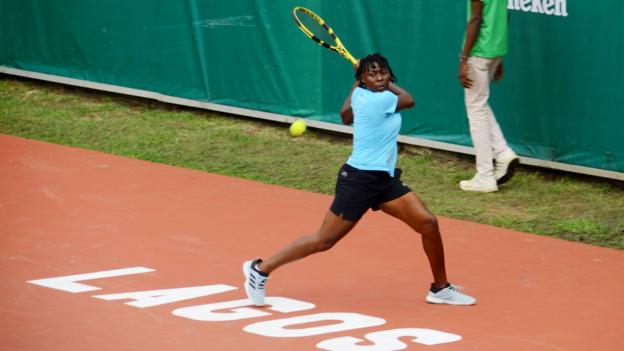
Ashe had been pivotal to the WCT’s decision to take the event to Lagos in the first place; he had previously visited Nigeria in 1970 with fellow American tennis star Stan Smith as part of a US State Department goodwill tour.
Despite the way it ended, the president of Nigeria’s Tennis Federation, Ifedayo Akindoju, thinks the impact of Ashe’s visit cannot be underestimated.
“Arthur Ashe brought two things: he came to Nigeria to play tennis and gave confidence to Nigerians that they can equally excel in this game,” he said.
“We didn’t have to travel to the US, we didn’t have to travel to the UK – tennis was right here under our nose in Lagos. We saw the same game being played with the same racket we hold.
“Secondly, not too long after, we had a lot of Nigerians – up to the early 1980s – that went even as far as playing in the Grand Slams.”
Nigeria has never had a Grand Slam champion but Kienka says Ashe’s memorable visit did bring national success.
“The young boys who were ball boys and officials at the tournament are still talking about it to today,” said the ITA director.
“Many of them became national champions in the country. The inspiration came from the visit of Arthur Ashe.”
Indeed, Kienka thinks it ultimately led to a “golden age” of Nigerian tennis.
“The impact still lives on, the legacy is enormous,” he claimed.
“It’s the same as when you have Messi, or Ronaldo, or Mbappe coming to Nigeria and playing football with children in schools.
“What impact they have on their sports career cannot be quantified. And that’s actually what happened.”

